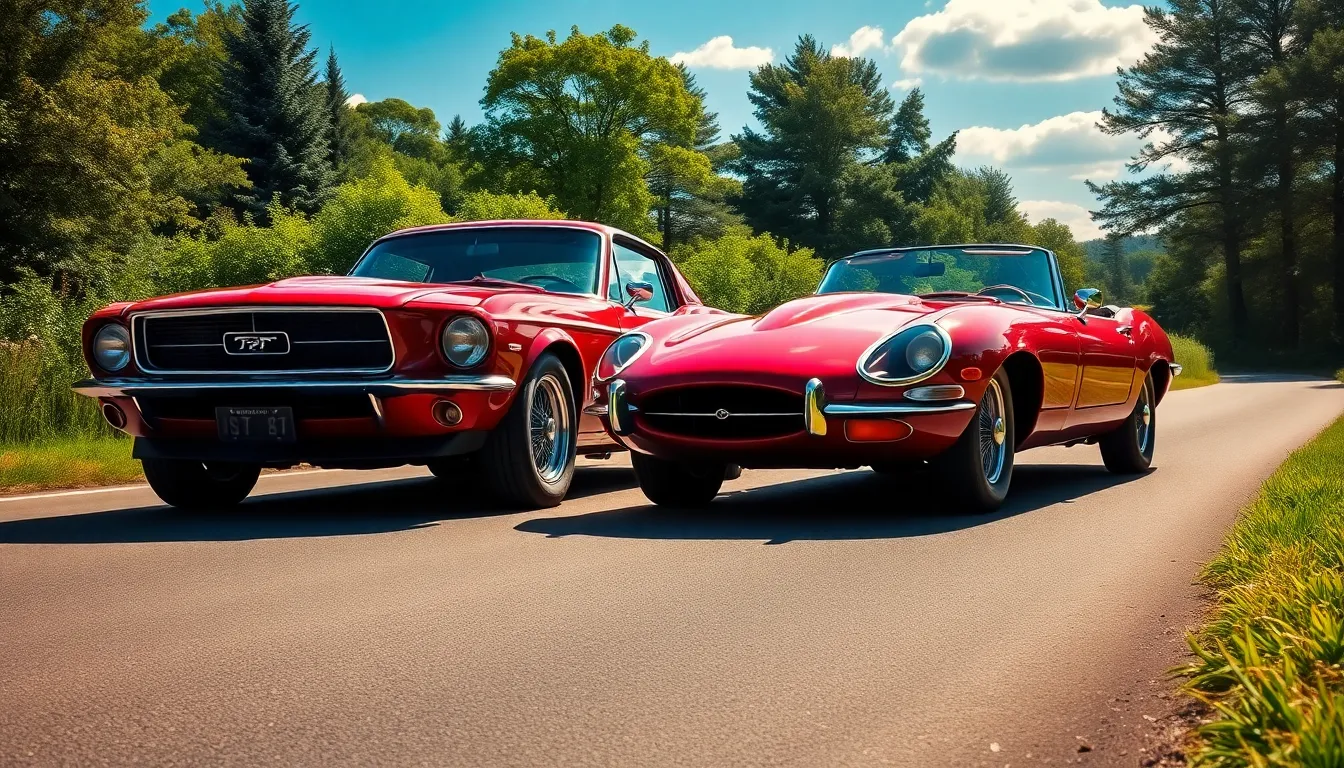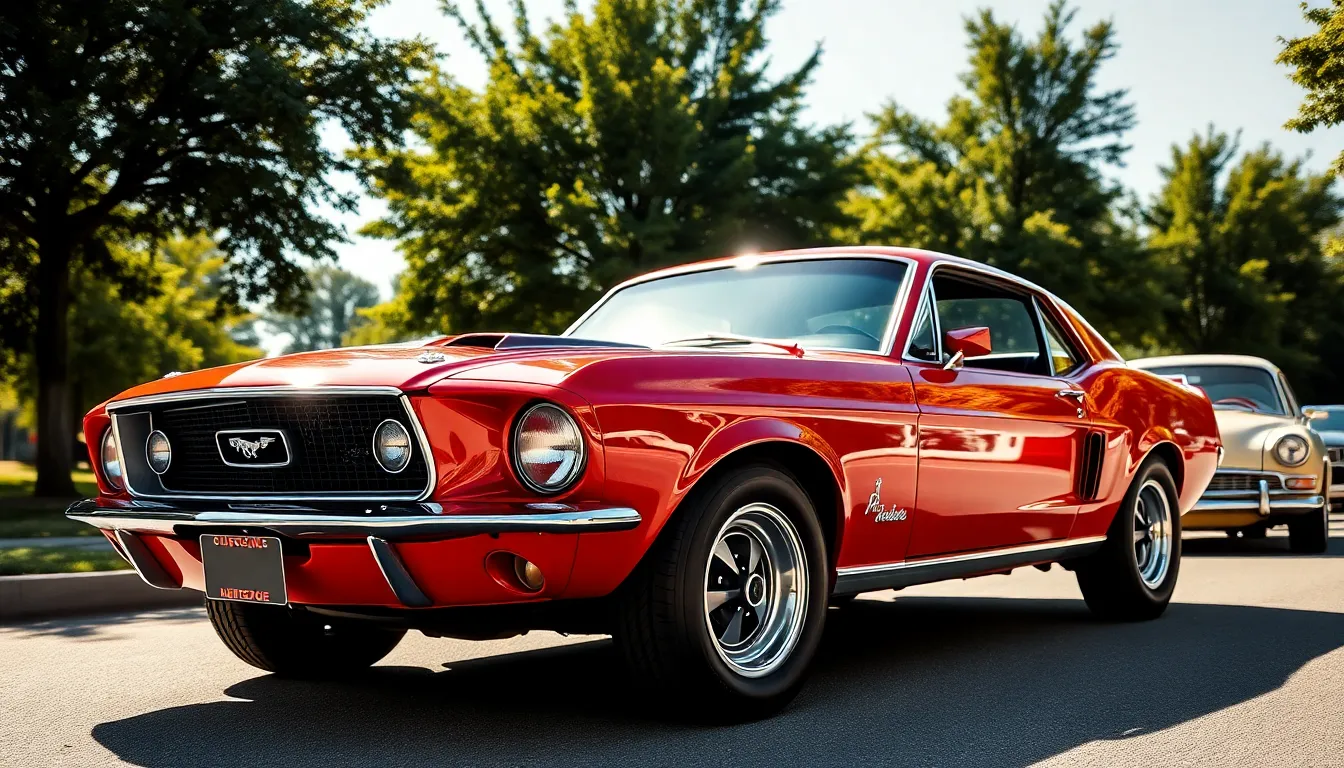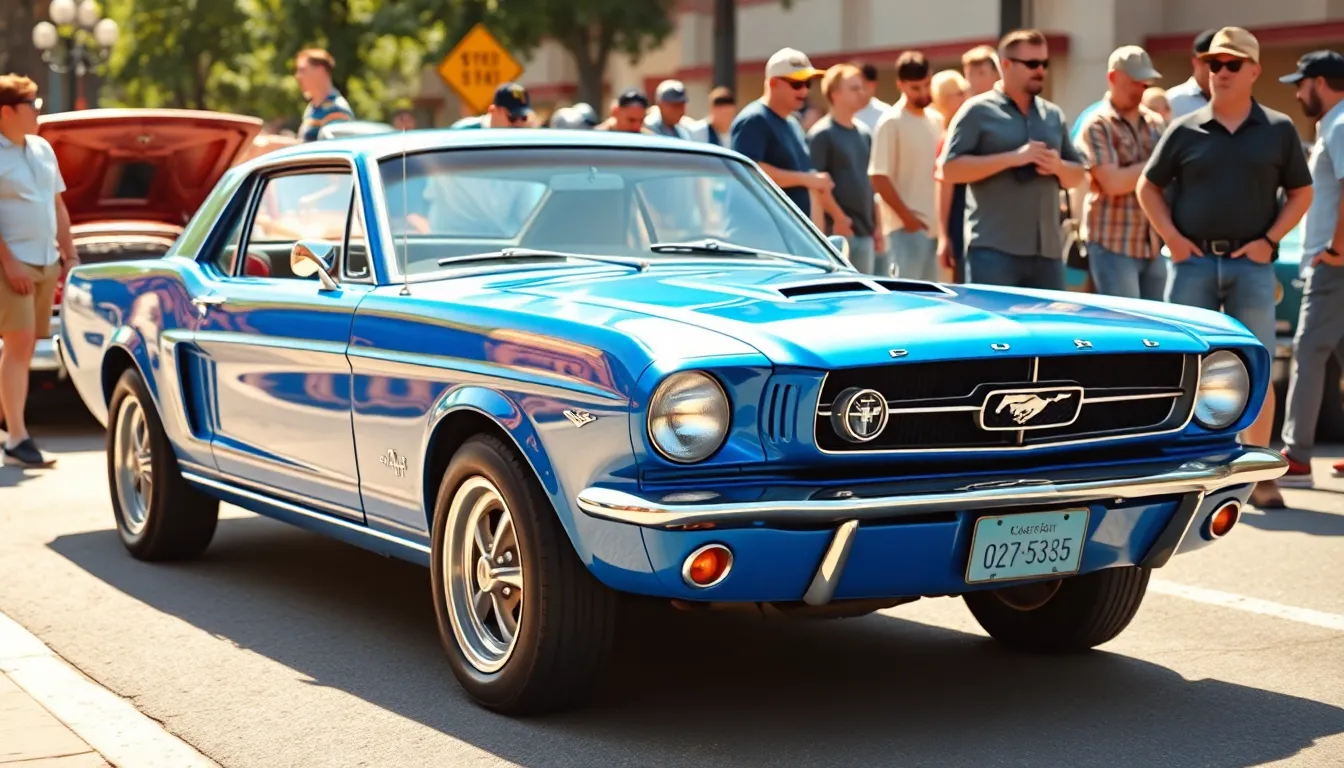Table of Contents
ToggleClassic cars aren’t just vehicles; they’re rolling pieces of history that evoke nostalgia and admiration. Picture cruising down the highway in a gleaming vintage Mustang or a charming Beetle, turning heads and sparking conversations. These beauties offer more than just a ride; they provide an escape from the mundane, a chance to relive the golden age of automotive design.
Overview of Classic Cars
Classic cars represent a unique blend of craftsmanship and history. These vehicles, generally manufactured during the mid-20th century, showcase design and engineering that resonate with car enthusiasts. Icons like the Ford Mustang, Volkswagen Beetle, and Chevy Corvette remain symbols of an era defined by style and innovation.
Characteristics define a classic car. Typically, vehicles over 20 years old with distinct styling make the cut. Owners often seek models that offer originality in features and performance, enhancing their collectible value. Rare models tend to command significant prices at auctions.
Restoration plays a crucial role in classic car ownership. Owners frequently undertake meticulous restoration projects to preserve authenticity. Efforts may include sourcing original parts and adhering to specific historical details. Such initiatives ensure that vintage vehicles stand the test of time.
Organizations and clubs support classic car enthusiasts. Many communities host events that celebrate these vehicles, facilitating connections among owners. Such gatherings often include car shows, rallies, and swap meets, fostering a vibrant exchange of knowledge and resources.
Driving a classic car can evoke strong emotions. It brings a sense of freedom and nostalgia that modern cars often lack. Enthusiasts appreciate the unique experience of handling vehicles that carry stories of the past. Engaging with fellow aficionados amplifies the enjoyment of ownership.
Investing in classic cars offers both financial and personal rewards. Values can appreciate significantly over time, making them lucrative assets. Driving or displaying a classic car allows owners to share their passion with others, creating lasting memories.
Popular Classic Car Models


Classic cars encompass a wide range of models, each with its unique appeal and historical significance. Some standout categories include muscle cars and vintage European cars.
Muscle Cars
Muscle cars, often celebrated for their raw power and speed, emerged predominantly in the 1960s and 1970s. Iconic models like the Ford Mustang, Chevrolet Camaro, and Dodge Charger exemplify this genre, offering robust V8 engines and aggressive styling. Enthusiasts often appreciate their performance capabilities and distinctive designs, which help maintain their desirability among collectors. Auctions frequently see these vehicles fetch high bids, a testament to their lasting appeal in the automotive world.
Vintage European Cars
Vintage European cars capture the elegance and sophistication of their time. Models such as the Jaguar E-Type, Porsche 911, and Aston Martin DB5 represent pinnacle craftsmanship and luxury. Driving experiences in these cars offer a blend of style and performance, attracting enthusiasts globally. The attention to detail in their design and engineering underscores why they remain highly prized in collector circles. Values of these models frequently appreciate, reflecting the continued fascination with classic European automotive heritage.
The Appeal of Classic Cars
Classic cars possess a distinct charm and allure that captivates enthusiasts. Their unique blend of history and craftsmanship makes them prized possessions.
Nostalgia Factor
Nostalgia plays a significant role in the appeal of classic cars. These vehicles often remind individuals of fond memories associated with family road trips or first cars. Classic models like the Mustang and Beetle evoke emotions tied to an iconic era of automotive design. Owners cherish the experience of driving these vintage cars, often feeling transported back in time. Significant moments can revolve around cruising on open roads, feeling the wind in one’s hair. People frequently gather at car shows and rallies, sharing stories that connect them to the past. This emotional experience reinforces the bond between the driver and the classic vehicle.
Investment Potential
Investing in classic cars offers financial benefits in addition to personal enjoyment. The market for classic cars has shown consistent appreciation over time. Certain models appreciate significantly, turning a passion into a lucrative long-term investment. Ford Mustang and Chevy Corvette often see positive returns due to their popularity among collectors. Condition and originality significantly impact a vehicle’s value. Owners who invest in meticulous restorations find that preserving historical details enhances their cars’ worth. Financially savvy enthusiasts recognize the potential for value growth as demand for classic cars continues to rise. This investment opportunity attracts those seeking both enjoyment and financial rewards.
Collecting Classic Cars
Collecting classic cars is a rewarding pursuit that attracts automotive enthusiasts from all backgrounds. Enthusiasts often seek out vehicles that represent significant moments in automotive history, enhancing their collections with iconic models like the Ford Mustang and the Volkswagen Beetle. Characteristics defining these cars include age, unique styling, and engineering excellence, making them stand out in any collection.
Restoration projects play a vital role in this hobby. Owners frequently invest time and resources into refurbishing their classic cars while maintaining authenticity. Sourcing original parts and adhering to historical specifications are key steps that collectors prioritize. Such meticulous restoration not only preserves the vehicle’s value but also enhances its historical significance.
Joining clubs and organizations can significantly enrich the collecting experience. These groups often organize car shows, rallies, and meetups where collectors share knowledge and celebrate their passion. Networking with fellow enthusiasts encourages the exchange of tips, resources, and connections, deepening appreciation for classic cars.
Investment opportunities exist within the classic car market as well. Many models, including the Chevy Corvette and Dodge Charger, have shown remarkable appreciation over time. Collectors recognize that certain classic cars represent not just a passion but also a potential for a lucrative financial return.
Emotional connections drive the desire to collect. Memories associated with classic cars often evoke nostalgia, whether from family road trips or that first automobile. Such feelings intensify the bond between collectors and their vehicles, making the pursuit of classic cars more than just a hobby.
Maintenance and Restoration Tips
Classic car maintenance requires regular attention to ensure longevity and performance. Inspecting fluids frequently, such as oil and coolant, helps maintain engine health. Checking tire pressure and tread wear contributes to safety and improves handling.
Restoration involves detailed projects that retain the vehicle’s originality. Sourcing authentic parts from reputable suppliers is essential for preserving historical accuracy. Stripping old paint and rust treatment should be conducted with care to avoid damaging the bodywork.
Regular washing and waxing protect the exterior from environmental damage. Applying high-quality wax provides a protective layer against UV rays and contaminants. Maintaining the interior through proper cleaning and conditioning of leather or fabric materials enhances overall aesthetics.
Engine tuning maintains optimal performance, ensuring the vehicle runs smoothly. Replacing worn belts and hoses during routine check-ups prevents breakdowns and costly repairs. Upgrading components, such as carburetors or ignition systems, can improve efficiency and power.
Documentation of restoration work adds value and credibility. Keeping records of parts and labor clearly demonstrates the car’s restoration history. Participating in clubs provides access to valuable resources and collective knowledge.
Investing time and effort into maintenance and restoration not only preserves classic car heritage but also enhances enjoyment for the owner. Enthusiasts find great satisfaction in caring for their vehicles, appreciating the craftsmanship and history that classic cars represent. Connecting with fellow enthusiasts builds a community that shares tips and experiences, enriching the ownership experience.





